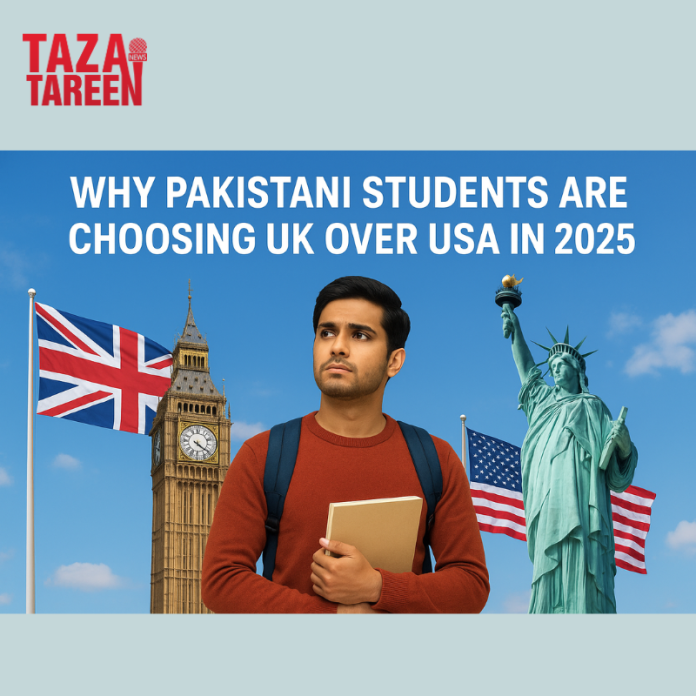In 2025, a noticeable shift has emerged in the study-abroad preferences of Pakistani students. For decades, the United States was considered the ultimate dream destination for higher education. But today, an increasing number of Pakistani students are favoring the United Kingdom over the USA.
The question is: why? Is it simply about tuition fees, or are there deeper factors at play—such as visa policies, career prospects, cultural comfort, or global recognition of degrees? Let’s dive into the reasons behind this major shift, backed by real-world examples, student experiences, and data.
Shorter Degree Duration = Lower Overall Cost
One of the strongest reasons Pakistani students are opting for the UK is the shorter duration of academic programs. In the UK, most undergraduate degrees are completed in three years, while master’s programs are typically one year long. By contrast, the US requires four years for a bachelor’s degree and two years for a master’s program.
This difference translates into significant savings on both tuition fees and living expenses. For a middle-class Pakistani family already struggling with currency exchange rates, shaving one to two years off education costs makes a massive difference.
Take the example of Ali, a student from Lahore, who completed his MBA in the UK in just one year.
Tuition Fees and Living Expenses
Living expenses are also more manageable in the UK, especially in cities outside London such as Manchester, Birmingham, and Glasgow. In contrast, American cities like New York, Boston, and San Francisco can cost international students upwards of $2000 per month in housing and living expenses.
For Pakistani families, the UK often represents a far more realistic financial choice.
Post-Study Work Opportunities
The post-study work environment is another reason behind the trend. The UK’s Graduate Route Visa allows international students to remain for two years after completing a degree, and three years for PhD graduates, giving them time to find employment.
The US offers OPT (Optional Practical Training), which provides only one year of post-study work authorization for most students. STEM graduates can extend this to three years, but non-STEM graduates often face uncertainty.
This predictability in the UK makes it easier for Pakistani students to plan their careers.
Cultural and Historical Connections
The UK feels like a “home away from home” for many Pakistani students. With over 1.6 million British Pakistanis, the diaspora is large, active, and supportive. From halal food to mosques to Urdu-speaking communities, the UK offers familiarity and comfort that makes adjusting easier.
In contrast, Pakistani communities in the US are smaller and more dispersed, often making students feel isolated.
Moreover, Pakistan’s education system has long been influenced by the British model. O/A Level students in particular find UK universities more aligned with what they have studied in school.
Visa Success Rates and Accessibility
Visa processing is another key reason. In 2025, the UK visa approval rate for Pakistani students is around 96%, reflecting a smoother and friendlier process.
The US visa process, on the other hand, remains more competitive and rigorous. Rejections are relatively more common, especially since visa interviews are stricter and require strong financial documentation.
This difference reassures students and parents that choosing the UK comes with fewer risks.
Scholarships and Financial Aid
Scholarships can make or break the decision for many Pakistani students. The UK offers well-known funding opportunities such as:
-
Chevening Scholarships
-
Commonwealth Scholarships
-
GREAT Scholarships
-
University-specific bursaries and discounts
While the US has the prestigious Fulbright program, its slots are limited and competition is intense. The wider range of scholarship opportunities in the UK makes it more attractive to Pakistani applicants.
Proximity and Family Considerations
Geography also plays a role. Flights from Pakistan to the UK take around 8 hours, while flights to the US can take 18 hours or more, often with higher costs.
For many Pakistani parents, knowing that their child is relatively close in case of emergencies is a huge relief. This practical consideration cannot be underestimated.
Key Takeaways
-
The UK offers shorter, more affordable degrees than the USA.
-
Post-study work visas in the UK are clearer and easier to obtain.
-
Strong cultural familiarity and a large diaspora make the UK more welcoming.
-
Visa success rates and accessibility further tilt the balance toward the UK.
-
Scholarships are more varied and attainable in the UK compared to the US.
In short, the UK has positioned itself as a smarter, safer, and more affordable choice for Pakistani students in 2025.
FAQs
Q1. Is the UK really cheaper than the USA for Pakistani students?
Yes. On average, UK education and living costs are 30–40% lower than in the USA.
Q2. Which country has better job opportunities after graduation?
Both countries offer opportunities, but the UK’s Graduate Route Visa gives Pakistani students a clearer path to employment.
Q3. Are scholarships more accessible in the UK?
Yes. While the US Fulbright is competitive, the UK provides a broader range of scholarships that are easier to secure.
Q4. Is the USA still better for STEM students?
Yes, the US continues to lead in STEM fields due to Silicon Valley, cutting-edge research, and global recognition.
Q5. Why do Pakistani parents prefer the UK?
Because of its cultural familiarity, shorter distance, and easier adjustment for their children.


